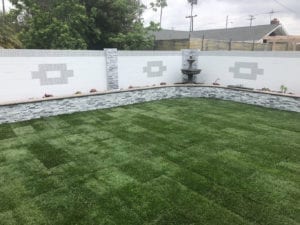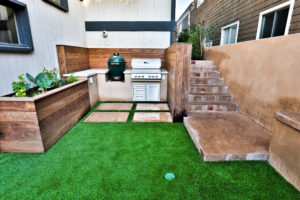Artificial grass, commonly known as synthetic turf or fake grass, has become an increasingly popular alternative to natural grass in Los Angeles, owing to its low maintenance, water-saving benefits, and aesthetic appeal. With the demand for artificial grass on the rise, it is crucial for residents and businesses in Los Angeles to understand the various factors that influence its pricing, including material costs, installation fees, and long-term maintenance expenses.

Material Costs
The cost of artificial grass in Los Angeles typically varies based on the quality, brand, and type of grass selected. Prices can range anywhere from $5 to $20 per square foot. Also, it depends on the specific requirements and the desired appearance. Higher-end products often offer a more realistic look and feel, with advanced features such as better drainage systems and UV protection, which can contribute to a higher price point. It’s important to consult with multiple suppliers and request samples to ensure that the chosen artificial grass meets both aesthetic and budgetary preferences.
Installation Fees
The installation cost of artificial grass in Los Angeles is another significant aspect to consider. Factors that can influence installation expenses include the size of the area, site preparation requirements, and the complexity of the installation process. On average, professional installation fees can range from $8 to $12 per square foot. Besides, this encompasses tasks such as excavation, base preparation, turf installation, and finishing touches. For larger projects or those with intricate landscaping features, the installation costs may increase accordingly. It is advisable to engage reputable installation professionals who have a track record of delivering high-quality work within the specified budget and timeline.
Additional Costs and Considerations
Beyond the initial material and installation expenses, it is essential to account for supplementary costs and ongoing maintenance requirements. These may include:
1. Infill Materials
Some artificial grass installations require infill materials such as sand or rubber pellets to enhance stability and resilience. Infill costs can range from $0.50 to $1.50 per square foot. Also, this depends on the selected material and the specific needs of the project.
2. Accessories and Add-ons
Certain projects might necessitate additional accessories, such as edging materials, adhesive products, or specialized drainage systems, which can contribute to the overall cost. Prices for these supplementary items vary based on the quantity and quality required.
3. Regular Maintenance
While artificial grass generally requires less maintenance compared to natural grass, periodic upkeep is still necessary to ensure its longevity and visual appeal. Routine tasks may include cleaning, grooming, and occasional repairs, which can incur additional costs over time.

Long-Term Benefits and Cost Savings
Despite the initial investment, artificial grass offers numerous long-term benefits that can translate into cost savings and environmental advantages. These benefits include:
1. Water Conservation
Artificial grass significantly reduces water consumption, providing substantial savings on water bills, particularly in drought-prone regions like Los Angeles.
2. Minimal Maintenance
Unlike natural grass, synthetic turf demands minimal upkeep, saving both time and money on mowing, fertilizing, and weed control.
3. Durability and Longevity
High-quality artificial grass is designed to withstand heavy foot traffic and various weather conditions, offering long-term durability and aesthetic appeal without the need for regular replacement.
4. Enhanced Aesthetics
Well-maintained artificial grass can enhance the visual appeal of residential and commercial properties, contributing to increased curb appeal and property value.

In Los Angeles, the cost of installation can vary significantly depending on various factors such as material quality, installation complexity, and ongoing maintenance requirements. While the initial investment may seem substantial, the long-term benefits and cost savings associated with artificial grass often outweigh the upfront costs. It is essential to conduct thorough research, consult with reputable suppliers and installation professionals, and consider the specific needs of the project to ensure a successful and cost-effective artificial grass installation in the vibrant landscape of Los Angeles. This comprehensive guide should provide readers in Los Angeles with a thorough understanding of the factors influencing the cost, enabling them to make informed decisions when considering artificial grass installations for their residential home or commercial properties.
To explore more information, make sure to visit How to Design a Low-Maintenance Garden.



